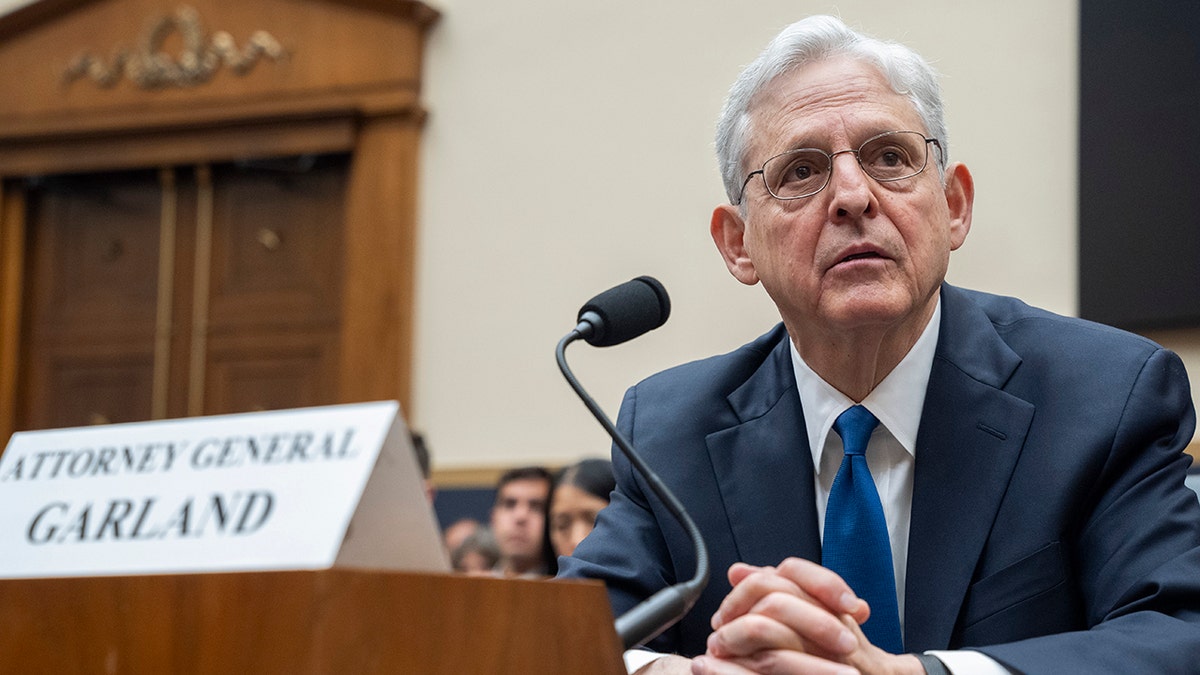Rep. Jim Banks, R-Indiana, is questioning why a federal prosecutor declined to bring charges against a man who threatened his family even though Justice Department has sued Democrats for similar threats — but the DOJ is denying a double standard.
Aaron Thompson, 33, of Fort Wayne pleaded guilty to felony and misdemeanor charges after leaving threatening voicemails at Banks’ office in October. Allen County prosecutors pursued the case and Thompson was sentenced to two years of probation, but Banks demanded to know in a letter to Attorney General Merrick Garland why the U.S. attorney for the Northern District of Indiana did not file federal charges.
“I am grateful to Allen County Prosecutor Mike McAlexander and Deputy Prosecutor Adam Mildred for taking these threats seriously and impartially enforcing the law,” Banks told Fox News Digital. “I want answers from AG Garland as to why he ignored threats against my family, but prosecuted similar threats against Democrats. This appears to be another example of the political weaponization of our justice system by the Biden administration.”
When contacted for comment, a Justice Department spokesperson pointed to more than a dozen lawsuits from individuals threatening Republican members of Congress, including threats made to Reps. Matt Gaetz, R-Florida, Marjorie Taylor-Greene, R-Ga., and Clay Higgins, R-La.
A DOJ spokesperson said the DOJ “investigates threats to public officials, regardless of party affiliation, and we have prosecuted numerous cases involving threats to both Republican and Democratic members of Congress.” Garland “has told Congress that he views threats to public officials as a threat to our democracy and the Department will continue to treat them as such.”
In an interview with US Capitol Police, Thompson admitted to making at least eight calls to Banks’ DC office. He said he was intoxicated at the time and disagreed with the Republican lawmaker’s political stances.
Indiana man charged with threatening to kill Republican Rep. Jim Banks and his daughters

Representative Jim Banks sent a letter to Attorney General Merrick Garland asking why the man who made threats against his family was not charged by federal prosecutors. (Kevin Dietsch/Getty Images)
In one such call, Thompson said he had a gun and gave Banks a choice between his life or his daughter’s. Banks has three young daughters.
“It’s a choice. Your daughters will grow up without their father, or you will grow old without your daughters,” Thompson said, according to the affidavit for probable cause. “… (B)oom, boom you choose…”
Read: Rep. Jim Banks’ letter to Attorney General Merrick Garland. App users: Click here
The letter was sent in December but was not made public until this week, Banks said. FBI Agent visited Thompson’s home in Fort Wayne to investigate the threats.
“Thompson, who had previously posted on social media encouraging his followers to ‘vote Democrat,’ admitted that he threatened me and my family with violence because he disagreed with my political beliefs,” Banks wrote.
Texas man convicted of threatening to kill Rep. Maxine Waters gets nearly 3 years in prison

Aaron Thompson of Fort Wayne, Indiana, called Representative Banks’ office at least eight times in April 2023 and left threatening messages. (Allen County Sheriff’s Department)
“When Capitol Police When the U.S. Supreme Court remanded the criminal case against Aaron Thompson to the U.S. Attorney for the Northern District of Indiana, he declined to prosecute, despite clear evidence that Thompson had violated federal law.”
Court records show Thompson pleaded guilty to a state crime of threatening and a minor offense of harassment. In Indiana, threatening is a Level 6 felony, while harassment is a Class B minor offense.
Banks, who is running for a vacant Senate seat in Indiana, cited public statements by Garland reaffirming the Justice Department’s commitment to prosecuting violent threats made against public servants and questioned why federal charges were not brought against Thompson when Democratic Reps. Eric Swalwell of California and Bennie Thompson of Mississippi were prosecuted for similar threats.
Recently, a Texas man was sentenced to nearly three years in prison for leaving threatening and racist voicemails for California Democratic Rep. Maxine Waters.
Johnson proposes cutting special counsel’s office funding amid Jack Smith’s Trump investigation

Attorney General Merrick Garland testifies during a House Judiciary Committee hearing on Capitol Hill on June 4, 2024. (AP/Jacqueline Martin)
Last week, Garland wrote an article. Article in the Washington Post In which political violence was condemned and it was condemned that his department had politicized its work.
“Disagreement about politics is good for our democracy. It is normal,” Garland wrote.
“But using conspiracy theories, lies, violence, and threats of violence to influence political outcomes is not normal. The short-term political gains of these tactics will never offset the long-term costs to our country.”
Click here to get the Fox News app
Mike Ferrara, a partner at New York firm Kaplan Hecker & Fink LLP and a former assistant U.S. attorney in the Southern District of New York, told Fox News Digital that it can sometimes be difficult for prosecutors to bring charges for threatening statements.
“Charges under federal threatening statutes can be difficult because they require prosecutors to prove very specific things about the offender’s intent. It is not enough to prove that the person who heard the words would have understood them as a threat. Instead, federal prosecutors must prove, for example, that the offender threatened to impede the officer’s performance of his duties, or that his words were intended to be threatening, or that he knew that the person to whom the words were directed would take them as a threat. These evidentiary problems are particularly complex in a case where the offender’s defense is that he made these statements because he was intoxicated,” Ferrara said.
“States certainly have a different set of laws they can choose to prosecute threats, which may not have evidentiary problems and which may be better suited to the offender’s conduct. I’m not familiar with Indiana’s laws, but if the state were to bring a criminal prosecution against the offender using state laws, that would be very normal — and I think a good exercise of prosecutorial discretion — for the federal government to delegate that discretion to state prosecutors.”
Fox News Digital’s Joe Schoffstall contributed to this report.















